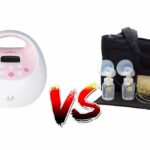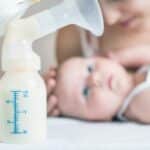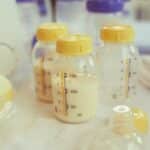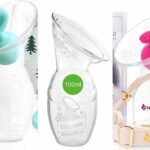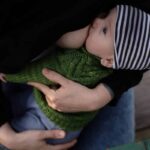Your beautiful baby is born and you are starting your breastfeeding journey, but you realize that you have very clearly lost your pregnancy glow.
Your skin looks dull, your hair is falling out at a tremendous rate and you only have to look at your nails and they crumble and break. So now you are wondering can you take hair, skin, and nail vitamins while breastfeeding?
Well, the quick answer is yes you can. So we decided to dive deep into the vitamins that are available, alternatives, and if you really need them at all.
What Are Hair, Skin, and Nail Vitamins?
Hair, skin, and nail vitamins most often contain vitamins A, C, and E, along with biotin which is a B-complex vitamin.
You will usually find a range of other nutrients mixed in as well such as iron, manganese, selenium, fish oil, and even flaxseed oil all of which help to support healthy hair, skin, and nails.
You will have seen a vast range of such vitamins up and down the shelves at your local stores and there is a common ingredient in all of them – biotin or vitamin H.
These components have been hailed as a miracle cure for hair loss, brittle nails, and even can help to improve skin tone.
Do I Need These Extra Vitamins Postpartum?
The American College of Obstetricians and Gynecologists (ACOG) advises that women should take postnatal vitamins for the entire time that they are breastfeeding.
Some experts say that the best practice is to keep taking them beyond your breastfeeding journey, especially if you intend on having more children.
Those women who choose not to breastfeed should also continue to take their prenatal vitamins for at least 6 months postpartum.
Are They Safe To Take While Breastfeeding?
The quick answer is yes. These types of products typically contain higher doses of vitamin D3, vitamin B6, and vitamin B12 – all of which help to keep mom and baby healthy.
Supporting a mom’s nutrition through what can be a very stressful period on your breastfeeding journey.
You will certainly have less time for cooking from scratch and taking care of yourself so having the option to ensure that you are maintaining the right levels of vitamins and minerals can be a weight off your mind.
Popular Postnatal Vitamins For Breastfeeding Moms
1. MegaFood, Baby & Me 2
[amalinkspro type=”image-link” asin=”B08L5JF3M5″ new-window=”true” apilink=”https://www.amazon.com/dp/B08L5JF3M5?tag=mominformedcom-20&linkCode=osi&th=1&psc=1″ img-size=”261,500″ addtocart=”false” nofollow=”true” alt=”MegaFood, Baby & Me 2 Postnatal Multi, 60 Tablets” alignment=”aligncenter”]https://m.media-amazon.com/images/I/412Ldm4rc5S._SL500_.jpg[/amalinkspro]
This is an Amazon Choice multivitamin specially designed for postnatal women. It contains a blend of key ingredients that support your body through the demands of breastfeeding and postpartum recovery.
[amalinkspro type=”cta-btn-css” ctabtn-id=”” asin=”” apilink=”https://www.amazon.com/dp/B08L5JF3M5?tag=mominformedcom-20&linkCode=osi&th=1&psc=1″ addtocart=”false” new-window=”true” nofollow=”true” alignment=”aligncenter”]Check Price[/amalinkspro]
2. Mama’s Select Post-Natal Plus Vitamins
[amalinkspro type=”image-link” asin=”B012U1G2N0″ new-window=”true” apilink=”https://www.amazon.com/dp/B012U1G2N0?tag=mominformedcom-20&linkCode=osi&th=1&psc=1″ img-size=”500,500″ addtocart=”false” nofollow=”true” alt=”Mama’s Select Post-Natal Plus Vitamins – Supports Breastfeeding & Lactation – Methylated B Vitamins, Iron & MethylFolate for Folic Acid – MTHFR Safe – 60 Veggie Capsules – 2 Month Supply – Postnatals” alignment=”aligncenter”]https://m.media-amazon.com/images/I/41T93ZgQoML._SL500_.jpg[/amalinkspro]
Mama’s Select helps to replenish your energy stores, promotes the health and growth of your baby, boosts immunity for both mother and baby, promotes healthy lactation, and does all this through targeted multivitamin and mineral support.
They are also manufactured in the USA for added peace of mind.
[amalinkspro type=”cta-btn-css” ctabtn-id=”” asin=”” apilink=”https://www.amazon.com/dp/B012U1G2N0?tag=mominformedcom-20&linkCode=osi&th=1&psc=1″ addtocart=”false” new-window=”true” nofollow=”true” alignment=”aligncenter”]Check Price[/amalinkspro]
3. NATURELO Postnatal Multivitamin
[amalinkspro type=”image-link” asin=”B07GMX3FJV” new-window=”true” apilink=”https://www.amazon.com/dp/B07GMX3FJV?tag=mominformedcom-20&linkCode=osi&th=1&psc=1″ img-size=”500,500″ addtocart=”false” nofollow=”true” alt=”NATURELO Postnatal Multivitamin – Supplement for Breastfeeding Women – Plant-Based Vitamin D, Folate, Gentle Iron – for Nursing Mother, Baby – Post Natal Lactation Support – 180 Vegan Capsules” alignment=”aligncenter”]https://m.media-amazon.com/images/I/51r9z1U+xcL._SL500_.jpg[/amalinkspro]
NATURELO is made with natural ingredients and is also suitable for vegetarians. It provides 100% of your daily requirements for all the essential vitamins such as A, C, D3, E, K2, and B complex as well as minerals like iodine, Zinc, and Selenium.
Not only is it designed to provide you with all the vitamins and minerals that you need on your postpartum journey, but also contains milk-boosting herbs to help increase your milk supply.
[amalinkspro type=”cta-btn-css” ctabtn-id=”” asin=”” apilink=”https://www.amazon.com/dp/B07GMX3FJV?tag=mominformedcom-20&linkCode=osi&th=1&psc=1″ addtocart=”false” new-window=”true” nofollow=”true” alignment=”aligncenter”]Check Price[/amalinkspro]
4. Nature Made Postnatal Multivitamin
[amalinkspro type=”image-link” asin=”B00OA7VTBS” new-window=”true” apilink=”https://www.amazon.com/dp/B00OA7VTBS?tag=mominformedcom-20&linkCode=osi&th=1&psc=1″ img-size=”500,500″ addtocart=”false” nofollow=”true” alt=”Nature Made Postnatal Multivitamin + DHA 200 mg, 60 Softgels, to Support Nursing Moms & Babies During Breastfeeding, Postnatal Vitamins & Nutrients Include Iron, Vitamin D3, Calcium, Iodine and More” alignment=”aligncenter”]https://m.media-amazon.com/images/I/51IjCe36LZL._SL500_.jpg[/amalinkspro]
Another Amazon’s Choice product, Nature Made contains 20 key ingredients that help to support the nutritional needs of breastfeeding mothers.
They also contain higher amounts of vitamins A, C, D, and E as well as DHA that all help to meet the increasing demands placed on your body while breastfeeding.
[amalinkspro type=”cta-btn-css” ctabtn-id=”” asin=”” apilink=”https://www.amazon.com/dp/B00OA7VTBS?tag=mominformedcom-20&linkCode=osi&th=1&psc=1″ addtocart=”false” new-window=”true” nofollow=”true” alignment=”aligncenter”]Check Price[/amalinkspro]
5. New Chapter Postnatal Vitamins
[amalinkspro type=”image-link” asin=”B00T8SBD74″ new-window=”true” apilink=”https://www.amazon.com/dp/B00T8SBD74?tag=mominformedcom-20&linkCode=osi&th=1&psc=1″ img-size=”500,500″ addtocart=”false” nofollow=”true” alt=”New Chapter Postnatal Vitamins Lactation Supplement with Fermented Probiotics + Wholefoods + Vitamin D3 + B Vitamins + Organic NonGMO Ingredients, Multi, 96 Count” alignment=”aligncenter”]https://m.media-amazon.com/images/I/51nKlAy9HEL._SL500_.jpg[/amalinkspro]
New chapter wholefood multivitamins are made with whole food ingredients and also include a few organic superfoods such as turmeric, oats, and kelp to support you through your postpartum journey.
This product is not only a multivitamin but it is also a multimineral and multiherbal product as well.
[amalinkspro type=”cta-btn-css” ctabtn-id=”” asin=”” apilink=”https://www.amazon.com/dp/B00T8SBD74?tag=mominformedcom-20&linkCode=osi&th=1&psc=1″ addtocart=”false” new-window=”true” nofollow=”true” alignment=”aligncenter”]Check Price[/amalinkspro]
What Else Can I Do To Take Care Of My Hair, Skin, and Nails Post Partum?
You can not stop postpartum hair loss, unfortunately. But there are ways that you can take care of your hair, skin, and nails while you are breastfeeding.
A Healthy and Balanced Diet
I know that when you have a newborn baby and are trying to juggle everything eating a balanced diet often comes at the bottom of your list.
But the truth is that we all know how important to our health and well-being a balanced diet is, especially when you are breastfeeding. Poor diet, as well as stress, can all contribute to dry, lifeless hair and skin, and brittle nails.
Your diet is even more important when you are breastfeeding as you are responsible not only for your nutritional requirements but also for those of your baby.
There are a few foods that you can add to your diet that can provide overall nutrition that will help your hair, nails, and skin look amazing.
Organic almond butter
Almonds are a great source of calcium, supporting strong nails and bones. They provide your body with Vitamin E that helps to support collagen production and provide your body with anti-inflammatory benefits. If you can’t stomach the almond butter you could always opt for raw almonds that are rich in biotin which helps to strengthen hair and nails.
Organic pumpkin seeds
Pumpkin seeds are a great source of protein, magnesium, potassium, biotin, and omega 3 fatty acid making them a superfood for your hair, nails, and skin. Eating 1/4 of a cup of pumpkin seeds every day will help to improve your hair, nail, and skin in no time.
Green leafy vegetables
View in gallery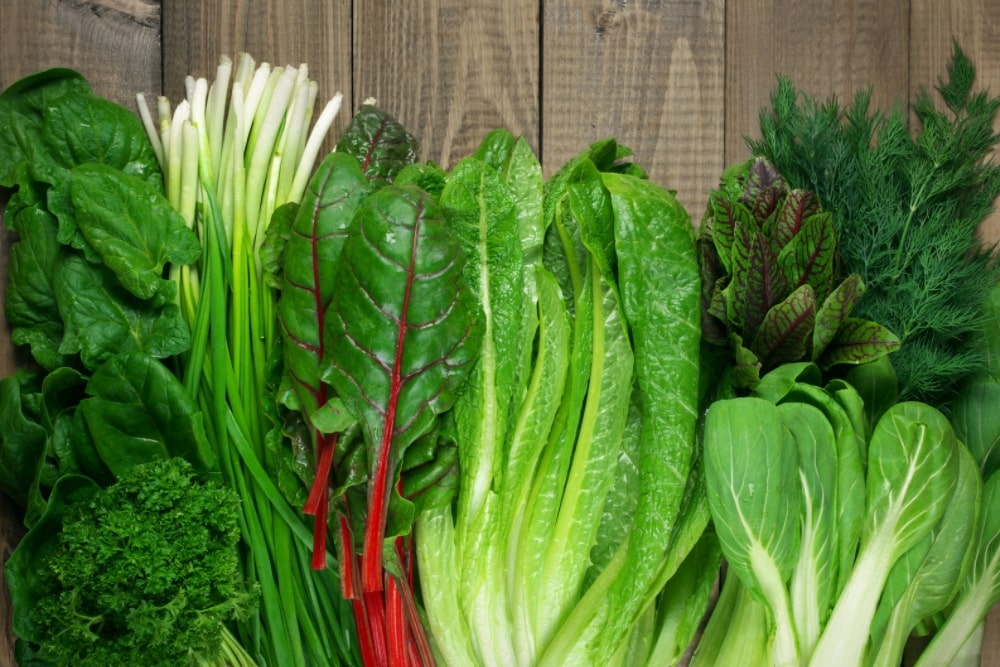
Including vegetables such as spinach, broccoli, kale, watercress, and spirulina in your diet will seriously help your vitamin intake. They contain vitamins A, C, E, K, iron, minerals, and even biotin all of which are good for healthy hair, skin, and nails.
Root vegetables
Root vegetables such as carrots, pumpkin, and sweet potatoes contain high amounts of vitamin A which help to support hair, nail, and skin.
Oats
Oats serve a dual purpose for the breastfeeding mom as they help to boost your milk production as well as being rich in protein and biotin which help to support healthy nails, hair, and skin.
Hydration
We all know that good hydration is essential for your health and is even more important when breastfeeding. On average a breastfeeding woman needs around 8 ounces of water each time she feeds and also with every meal she eats.
Staying hydrated is a great way to get rid of the toxins in your body, it helps your skin and hair look healthier as they are getting enough hydration too.
I know that many people myself included do not enjoy plain water but there are many things that you can add to your glass of water to make it a little more interesting and help to quench that thirst.
- Herbal Tea – such as Mother’s milk or Milkmaid Tea.
- Sports Drinks – Bodyarmor sports drinks or GoodSport Citrus sports drinks.
- Coconut Water – Vita Coco coconut water or Zico natural 100% coconut water.
- Infused Water – A great option for a change and you get to add any flavors that you like. To help you stay on track you could always treat yourself to an infuser.
Postnatal Vitamins
While most women can get all the vitamins and minerals that they need from their balanced diets, it can sometimes be difficult to eat healthily when you are rushing around trying to take care of a baby.
So to ensure that even when your lunch consists of chocolate biscuits and leftover pizza you are still getting all the vitamins and minerals that you need via your postnatal vitamins.
View in gallery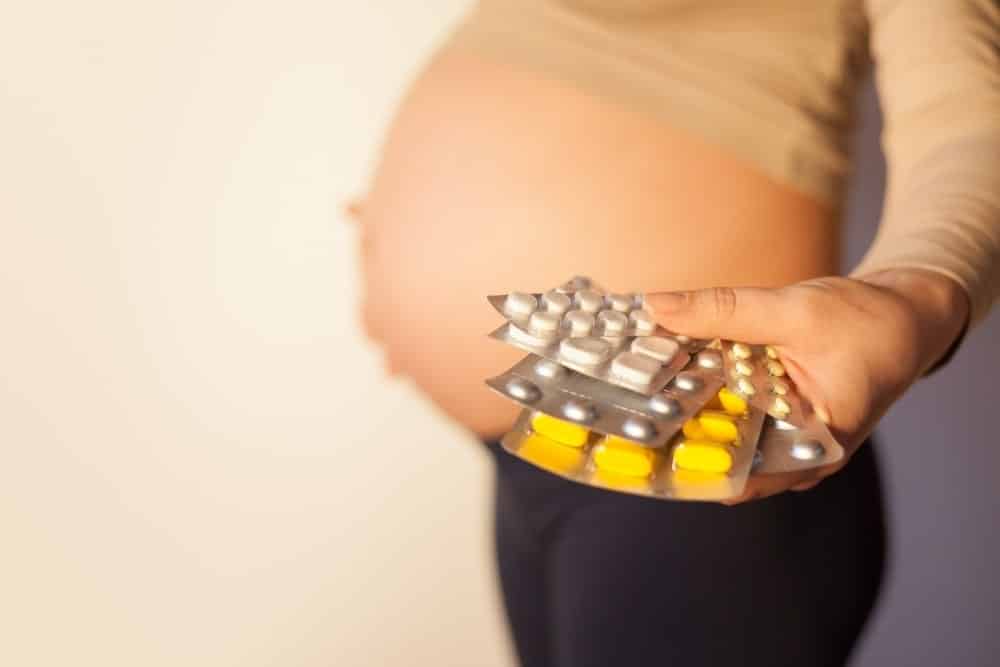
Postnatal vitamins are different from prenatal ones as they are designed towards the needs of a postpartum body that is potentially breastfeeding. They contain ingredients to boost your milk supply as well as vitamin B complex to support the growth of healthy hair.
Shampoo and Conditioner
Changing your shampoo and conditioner from one that is loaded with chemicals to one that is plant-based, toxin-free, and vitamin-enriched can help to protect your hair from breakage and stimulate hair growth.
[amalinkspro type=”showcase” asin=”B07WFRVQ5P” apilink=”https://www.amazon.com/dp/B07WFRVQ5P?tag=mominformedcom-20&linkCode=osi&th=1&psc=1″ new-window=”true” addtocart=”false” nofollow=”true” sc-id=”5″ img-sizes=”500:500″ imgs=”https://m.media-amazon.com/images/I/31jsUVGGrUL._SL500_.jpg” link-imgs=”false” btn-color=”#ff9900″ btn-text=”Check Price” alignment=”aligncenter” hide-prime=”0″ hide-image=”0″ hide-price=”1″ hide-button=”0″ width=”550″]Organic Bubbles[/amalinkspro]
Face Masks
You are postpartum and have lost that wonderful pregnancy glow. You are now left with dry, lifeless, and dull skin. Now may be the time to step up with your skincare regime and get in a hydrating face mask once a week. These types of masks will leave your skin smooth, refreshed, and with a radiant glow.
[amalinkspro type=”showcase” asin=”B07MBXZLLC” apilink=”https://www.amazon.com/dp/B07MBXZLLC?tag=mominformedcom-20&linkCode=osi&th=1&psc=1″ new-window=”true” addtocart=”false” nofollow=”true” sc-id=”5″ img-sizes=”500:500″ imgs=”https://m.media-amazon.com/images/I/511KpYlYn0L._SL500_.jpg” link-imgs=”false” btn-color=”#ff9900″ btn-text=”Check Price” alignment=”aligncenter” hide-prime=”0″ hide-image=”0″ hide-price=”0″ hide-button=”0″ width=”550″]Sand & Sky Perfect Skin Bundle[/amalinkspro]
Nail Care
Not only has your skin and hair paid the price to the postpartum gods but your nails have as well. A good manicure will help if your nails are weak and brittle.
I know that you may not have a minute to yourself but if you could buff your nails and add a nail strengthener that will also help to improve their condition.
FAQs
What vitamins can I take for hair loss while breastfeeding?
Biotin is considered part of the B vitamins and is a great source of protein. As well as vitamin A which plays a crucial role in cell growth including nails and hair. Vitamin C and D contain antioxidants and help stimulate the hair follicles, which assist with hair growth.
Is collagen and biotin safe while breastfeeding?
There are currently no known risks for taking collagen while pregnant or breastfeeding. But as with any supplement that you take it is best to consult with a doctor if you have any concerns.
What is the best vitamin for breastfeeding mothers?
There are many vitamins and minerals that you need when you are breastfeeding to keep yourself and your baby healthy. But most people who are eating a healthy and balanced diet get all the nutrients that they need.
But the vitamins and minerals that you do need to ensure that you are getting enough of are iron, iodine, vitamin D, vitamin B12, Choline, and docosahexaenoic acid or DHA.
Does breastfeeding cause hair to fall out?
Almost all new moms experience some hair loss postpartum. Sometimes it is a dramatic amount and other times it is a small amount. But do not worry this is completely normal and temporary. It is also in no way related or linked to breastfeeding.
Does cutting hair help with postpartum hair loss?
Going for that practical ‘mom cut’ may lessen the appearance of hair loss but it will not prevent it. After all the hair you are losing is just part of the natural cycle of your hair.
The Final Thought
When you have given birth your body and life change drastically. Hair loss, dull skin, and brittle nails are often the most noticeable changes. But there are definitely things that you can do to improve the situation, many of which we have discussed above.
But if you are still considering taking hair, skin, and nail vitamins it would be best to discuss this with your doctor beforehand. Also, remember that anything you ingest does have the potential to alter the taste of your milk and this may turn your baby off your breastmilk.
